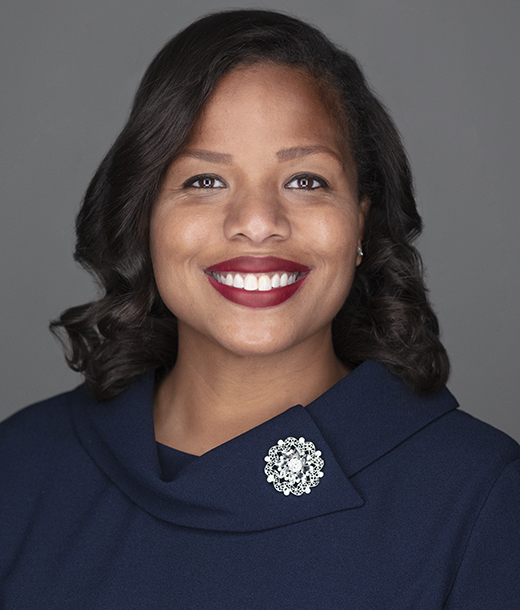George Edgecomb Scholar Takes on New Leadership Roles at Moffitt
Tiffany Carson, PhD, was an undergraduate biology student at Florida State University and looking forward to the day when she would get admitted to medical school so she could go on to become a physician.
But as she immersed herself in the practice of science, including designing and implementing her own experiments and studies, she had a revelation.
As a physician, she would treat one patient at a time. But as a researcher, she could potentially improve the lives of whole communities, by finding better and more effective ways of delivering health care.
"I started to see public health as another viable way to have an impact on health in communities, maybe even at a larger level in some ways,” she said.
“It’s about having wider reach, being able to do scientific work and hopefully make discoveries that can change the lives of hundreds or thousands, even millions of people, if I can discover something that can be that impactful.”
Carson was especially interested in engaging underserved communities, especially those that do not have equal access to health care.

Carson completed master’s and doctoral degrees in epidemiology at the University of Alabama-Birmingham. She came to Moffitt Cancer Center in 2021 as an associate member and George Edgecomb Scholar.
She recently took on three new leadership roles that put her at the forefront of key Moffitt research efforts, both in the Tampa Bay area and globally.
In October 2023 Carson was named co-leader of Moffitt’s Health Outcomes and Behavior Program, where she works closely with fellow-co-leader Heather Jim, PhD. The program works to improve cancer outcomes by understanding and improving individual health behaviors, social networks, health care systems and communities.
“I want this program to be on the leading edge of behavioral research to reduce the incidence and mortality rate of cancer in Moffitt’s 23-county catchment area, because this work is so important” she said. Carson says the Moffitt scientists in this program are “among the nation’s best, if not the world’s best, at doing research across the cancer continuum.”
In January she was named scientific director of Moffitt’s Population Engagement and Research Laboratory, or PEARL. This state-of-the-art research lab focuses on prevention, screening, and survivorship based on a person’s unique biologic and behavioral characteristics.
“PEARL is a hub for research at Moffitt that brings together population-based scientists, basic scientists, clinicians, community members and other collaborators,” she said. “PEARL has a research kitchen and dining room to support nutrition- and diet-related research, an exercise space, sophisticated equipment to measure body composition and even some rooms that are uniquely equipped to allow for smoking to support the work of our tobacco cessation researchers.”
Earlier this year, Carson received a Cancer Grand Challenges Award, which allows her to join an international team that is building a resource to measure social, environmental, genetic and biological factors that lead to disparities in prostate, breast and pancreatic cancers among people of African descent in regions of the United States, the United Kingdom and five countries in Africa.
“This population tends to have the highest burden of these cancer types. So, it’s important to be able to conduct rigorous studies to understand those who are most affected,” she said.
In her own research, Carson focuses on health disparities, obesity treatment and cancer risk reduction. Obesity increases the risks of more than a dozen cancers, and some minority communities have higher rates of obesity. She researches effective ways of reaching those communities to promote healthier diets and increased physical activity.
A case in point: She received a 2023 George Edgecomb Society Grant to adapt an existing stress-management and behavioral weight loss intervention so that it is tailored to reach Black breast cancer survivors.
“I'm a huge fan and supporter of the George Edgecomb Society,” she said. “I think it's incredibly important to have a group of people who are very devoted to improving health for underserved communities. The society obviously is primarily focused on the reducing cancer burden in Black and African American communities which tend to have a higher burden of cancer than other populations. Having a targeted focus on this community is critical to improving outcomes.”
George Edgecomb Society eLetter: June 2024
